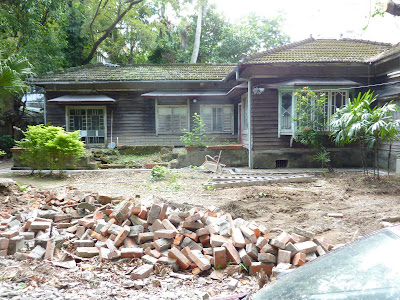Out our back bedroom window we have this view. There is a small street, then a wall, and inside the wall a quaint, one-story dwelling with palm trees around it. We are told that at one time this city was covered with these Japanese homes.
 This island has been controlled by many different peoples over the years. First there were aborigines which still exist and make up about 2% of the Taiwanese population. Then there was the Chinese colonization during the Qing dynasty. The Dutch controlled it for a while and in the 19th century the Japanese tried to take it over. They were not successful until 1895, after which they ruled here for 50 years, until the end of World War II. They tried to make the people learn the language and attend Japanese schools (the lucky few who got schooling). Now, after 65 years, there still are some of these buildings around the city. Most of them are owned by the government, we are told. As they need space for other things, they tear them down.
This island has been controlled by many different peoples over the years. First there were aborigines which still exist and make up about 2% of the Taiwanese population. Then there was the Chinese colonization during the Qing dynasty. The Dutch controlled it for a while and in the 19th century the Japanese tried to take it over. They were not successful until 1895, after which they ruled here for 50 years, until the end of World War II. They tried to make the people learn the language and attend Japanese schools (the lucky few who got schooling). Now, after 65 years, there still are some of these buildings around the city. Most of them are owned by the government, we are told. As they need space for other things, they tear them down. We have been told about a house being there one day, being torn down the next, and replaced with a park the next. A week of two ago they tore down the wall in front of this house and we expected to see it demolished the next day. This is located one block from our apartment.
We have been told about a house being there one day, being torn down the next, and replaced with a park the next. A week of two ago they tore down the wall in front of this house and we expected to see it demolished the next day. This is located one block from our apartment.  The owner of this car has not moved it for quite a while. They were able to build the wall, but they were not able to plaster the brick for the section next to the car.
The owner of this car has not moved it for quite a while. They were able to build the wall, but they were not able to plaster the brick for the section next to the car.  In the background you can see a Japanese house, and I suspect there was one in the foreground, but it has been replaced by a parking lot.
In the background you can see a Japanese house, and I suspect there was one in the foreground, but it has been replaced by a parking lot. 






Thanks for the tour around the town, and for a little bit of the history there!
ReplyDeleteActually, about 75% of the local population received some form of schooling in the Japanese period, either in Chinese or Japanese, maybe even more. The Japanese counted as "literate" only those who knew Japanese. See Tsurumi's book on colonial Education in Taiwan.
ReplyDeleteChinese colonization is an artifact of Dutch colonial policy. See Tonio Andrade's How Taiwan became Chinese which is available online.
It is hard for me to understand how you could deplore the Japanese attempting to remake the local Han population into Japanese subjects, since Japanese colonialism mirrors the Mormon project -- you wish to remake them into good little Mormon subjects. Not any difference in end or attitude, simply that the Japanese had the advantage of being able to do it at gunpoint.
Michael